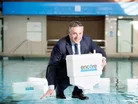New air con powered toilet could save hotel industry billions of litres of water

All hotels consume large amounts of water. Whether it be for swimming pools, laundry or shower facilities for guests, it makes a constant and significant appearance on balance sheets.
But now there could be a new way for hotels and large hospitality venues to save huge volumes of water and money, thanks to an innovative toilet cistern.
Encore is the world’s first toilet that can be flushed using condensation generated from air conditioning.
RELATED STORIES:
- 5 start-ups helping to innovate the hotel industry
- Ritz-Carlton is launching hotels on three massive luxury yachts
- Viceroy Palm Jumeirah hotel in Dubai loses court case and must retain Viceroy as operator
So how does it work? Encore holds 18-litres of water - three times more than a conventional cistern but its dual-chamber design means it fits like standard models. The bottom chamber holds 6-litres, which comes from the mains pipe. The upper 12-liter chamber is filled with air conditioning condensate.
When the toilet is flushed, the lower chamber empties then refills with condensate from the upper chamber. If there are multiple flushes close together or the air conditioning is not in use, the cistern is filled by the mains fed pipe. If the toilet is not used for a period, surplus condensate is fed away.
Data from hotel specialist STR Global shows 77,360 rooms in 487 hotels are currently being built in Europe. Compared to traditional cisterns, using Encore would save the average 158-bed European hotel 3.08m litres based on standard 80% occupancy levels. In total, Encore would save them 1.5bn litres of water a year, filling the equivalent of 600 Olympic swimming pools.
Encore Technical Director, David Davis, said: "Air conditioning units have a pipe that drains all the condensate away. We've developed the only cistern that uses this free water to flush the toilet.
"When you consider how many buildings use air conditioning globally, billions of litres of condensate water is generated all of which has been wasted - until now.
"All buildings need toilets so why wouldn't you use a cistern that recycles a free, sustainable water source especially when there is a global water shortage crisis?"
- Choice Hotels in management shakeup: Who is new CEO Patrick Pacious?Hotels & Hospitality
- Axiom Properties is building a luxury hotel at Sydney’s Richmond ClubHotels & Hospitality
- 5 start-ups helping to innovate the hotel industryHotels & Hospitality
- Costa and Premier Inn sales growth fuels strong Q1 results for WhitbreadFranchising



